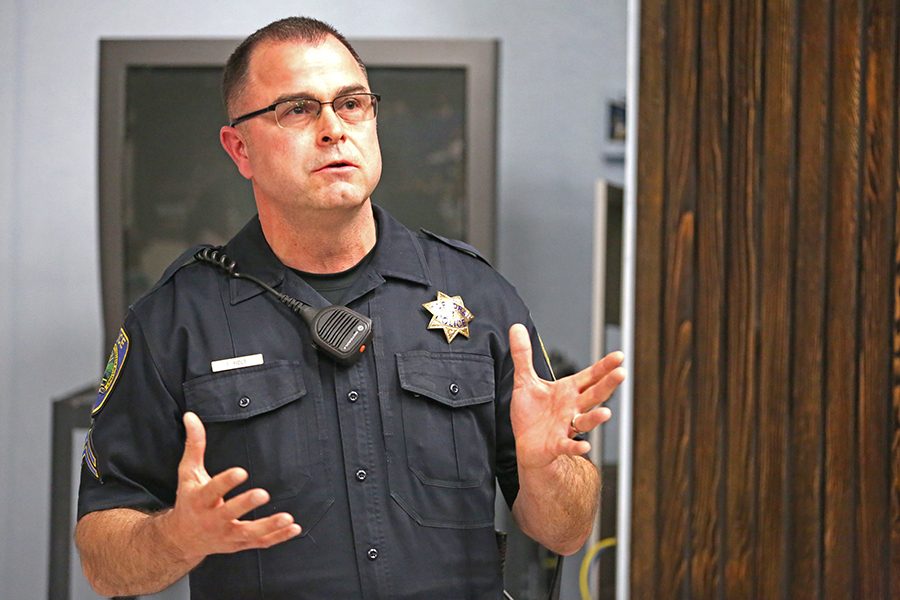Film exposes culture of harassment, opens debate
Panel discusses attacks, filing assault charges
Christian Urrutia / The Advocate
Lt. Tom Holt attended the “Coffee with a Cop” event held Sept. 20 in the Fireside Hall.
May 9, 2016
To bring attention to Sexual Assault Awareness Month, a viewing of the documentary “Hunting Ground” and a public question and answer panel were held in LA-100 on Thursday to talk about the societal ills that create a culture of silence among sexual crime victims.
“We tend to keep that stuff under the rug,” Student Activity Coordinator Erika Greene, who hosted the event, said. “If we don’t talk about it (sexual harassment, stalking and assault) keeps perpetuating.”
About 70 students and faculty members were present throughout the film’s showing and the panel discussion. The panel was comprised of District Attorney Andrea Tavenier, Police Services Corporal Tom Holt, Dean of Student Services Vicki Ferguson and members of the Contra Costa County Rape Crisis Center Prevention (CCCRCCP) Team Javier Lopez, Lilliana Gonzalez and Monique Thomas.
Ferguson said while sexual assault, stalking and harassment are difficult to talk about, a discussion is necessary to change a culture that shuns victims.
“Hunting Ground” provided the first-hand experiences of survivors of sexual assaults on their college campuses, and focused on two survivors who exposed the lack of action from university administrators in reprimanding the assailants.
Gasps, sniffling and comments of disbelief echoed in the lecture hall as the film presented the reality of what happens to young students throughout the nation.
There was a counselor present and ready to tend to anyone who might have had an emotional reaction to the film’s content.
The film exposed victim blaming and how male students, particularly athletes and fraternity members, tend to get a pass on sexual crimes on college campuses.
“Where is the education? Why are (certain universities) not protecting the students,” ASU Vice President of Club Affairs Safi Ward-Davis said. “No one is teaching (how sexual crime affects people). That’s why there is an epidemic.”
After the documentary’s showing the panelists regrouped and students were able to ask questions regarding the documentary or clarification as to how the procedures of filing sexual assault complaints takes place.
CCC student Jose Sanchez, who attended the screening and panel, said, “It’s something that the school should cover in general. Crime is a good thing to cover in school.”
The members of the CCCRCCP shared resources that are available to anyone in the community, including filing a charge, legal assistance and as much counseling as the victim needs. “We also respect if victims do not wish to press charges,” Lopez said.
Holt said students could always go through Police Services for any incident that happened on or off campus. He said people should report any kind of sexual abuse as their anonymity would be respected if the victim prefers.
Students were able to express their disbelief at how sexual assault is handled by some of the most prestigious universities nationwide.
It’s important to discuss the topic more frequently, ASU President Nakari Syon said.
Ferguson said there is no tolerance sexual assault, stalking or harassment at CCC. She informed students at the event of the actions that could be taken if they have been victims of a sexual crime.
The college can provide resources for victims and also separate the victim from the assailant and provide counseling to cope with the traumatic experience.
Ferguson said any violations to the student code of conduct should reported to her. She explained that one of their goals is to educate the college campus.
This includes making sure that both students and faculty are aware of the student code of conduct and Title IX, which does not allow for discrimination on the basis of sex, so they can effectively identify and report any incidents.
One of the goals of the event was to be able to inform students, particularly those who are transferring soon.
“When people go to school they tend to consider the academics, not the safety of the campus,” Ward-Davis said.
Ferguson said, “The more we talk about (sexual assault, harassment and stalking) the more students and faculty will feel comfortable talking about what needs to be done.”



Akdjshd • Feb 19, 2020 at 11:48 pm
Tom holt is a lieutenant